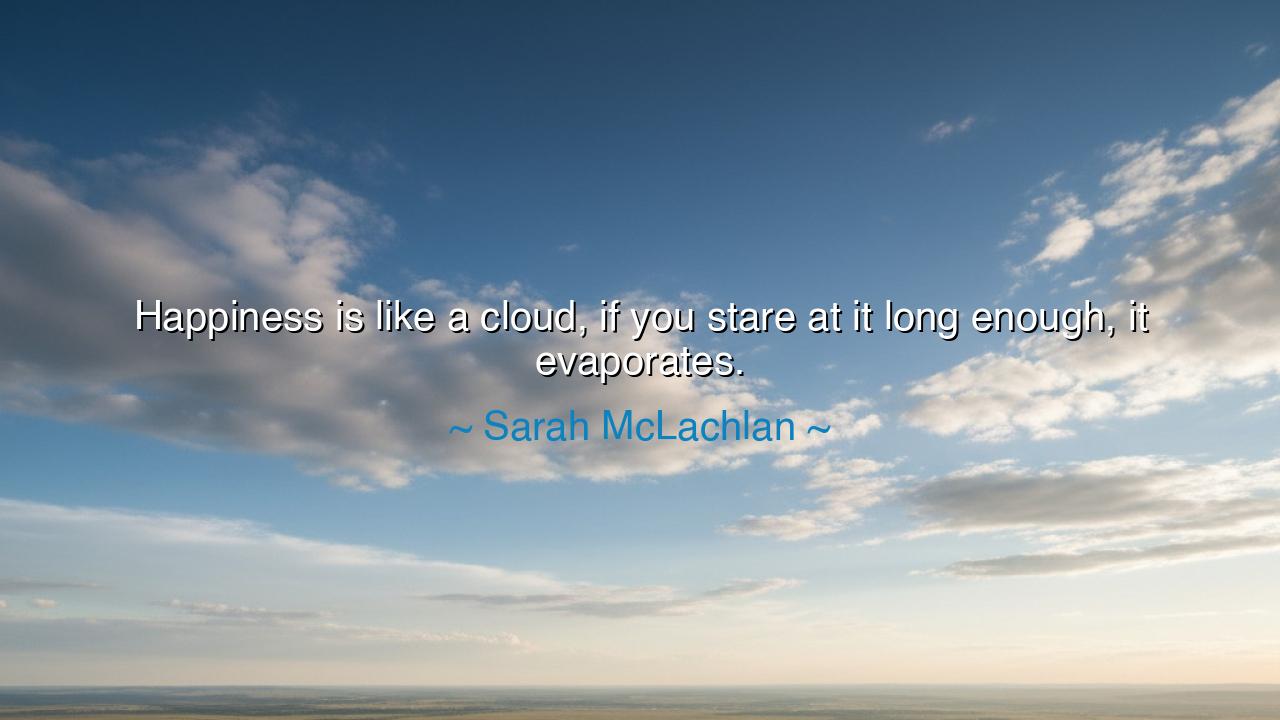
Happiness is like a cloud, if you stare at it long enough, it






In the quiet voice of the poet Sarah McLachlan, there arises a truth both tender and profound: “Happiness is like a cloud, if you stare at it long enough, it evaporates.” These words drift across the soul like wind through tall grass, soft yet filled with ancient wisdom. For she speaks not merely of clouds or fleeting joys, but of the very nature of the human heart — how it grasps, clings, and in the act of clutching, loses what it most desires. Like the ancients who watched the skies and learned from their movement, McLachlan teaches that happiness, too, is a passing form — meant to be felt, not captured; lived, not dissected.
Happiness, by its very essence, is fragile and transient. It comes not by command, nor does it linger under scrutiny. When we chase it too fiercely, it slips through our fingers, as mist through an open hand. This is the great paradox of joy: to hold it, one must first let go. Those who demand happiness — who examine every moment, wondering, “Am I happy now?” — find only restlessness. But those who live simply, who give themselves fully to the moment, discover that happiness comes unbidden, like sunlight breaking through the clouds.
The cloud, as McLachlan saw it, is a mirror of the heart’s longing. It is beautiful because it is fleeting. To stare too long is to destroy the wonder; to try to fix it in place is to forget its nature. So too with joy — it is the movement of life itself, not a stillness to be preserved. The wise understand this: that to experience beauty is not to possess it, but to witness it with gratitude before it changes shape.
Consider the tale of Princess Diana, whose life was filled with splendor yet shadowed by sorrow. Surrounded by luxury, she searched for meaning, for connection, for happiness that could not be bought or commanded. When she ceased striving for perfection and began to live for compassion — when she held the hands of the sick, embraced the forgotten, and acted from love — happiness found her, softly, quietly. Like the drifting of clouds after a storm, it came not from what she sought to control, but from what she gave away. Thus her story reveals what McLachlan’s words conceal within their poetry: that happiness blooms only when we stop grasping for it.
The ancients, too, knew this truth. The Stoics spoke of tranquility, not as the absence of emotion, but as harmony with the flow of existence. The Buddha taught that suffering begins with attachment — the attempt to make the impermanent last forever. Both would nod at McLachlan’s insight: that happiness, when chased, dissolves; when allowed, descends. The one who is content to watch the clouds will find joy in every shape they take; the one who demands the sky stay still will find only emptiness.
There is a quiet heroism in learning to let go. For in letting go, we show trust — trust in the rhythm of life, in the coming and going of feelings, in the truth that no sorrow is eternal, and no joy is owed. The wise do not measure their days by happiness, but by presence — by how deeply they lived, how openly they loved, how freely they breathed. In this way, happiness ceases to be a prize and becomes a companion, one that visits when the heart is still enough to welcome it.
So, my children, heed this counsel: Do not chase happiness as though it were prey. Let it come and go, like the wind that cools the brow or the rain that blesses the earth. Tend instead to the soil of your soul — gratitude, kindness, patience — and happiness will alight upon you as gently as a cloud upon a mountain peak. When it comes, smile. When it passes, smile still. For the secret is not to hold the cloud, but to cherish the sky that bears it.
And remember this: Happiness is not something to find — it is something to live. Be present. Breathe deeply. Do your work with love. Speak with kindness. Watch the clouds — not to capture them, but to marvel at how beautifully they drift. In this simple way, you will discover what the ancients always knew — that peace, not pursuit, is the heart of joy, and that happiness, once released from grasp, will return again and again, like the endless dance of clouds across the eternal sky.






AAdministratorAdministrator
Welcome, honored guests. Please leave a comment, we will respond soon